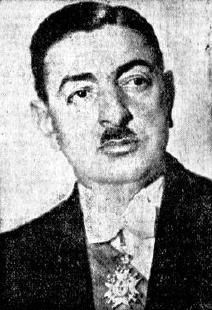Dragiša Cvetković facts for kids
Quick facts for kids
Dragiša Cvetković
|
|
|---|---|
|
Драгиша Цветковић
|
|
 |
|
| 13th Prime Minister of Yugoslavia | |
| In office 5 February 1939 – 27 March 1941 |
|
| Monarch | Peter II |
| Preceded by | Milan Stojadinović |
| Succeeded by | Dušan Simović |
| Personal details | |
| Born | 15 January 1893 Niš, Kingdom of Serbia |
| Died | 18 February 1969 (aged 76) Paris, France |
| Occupation | Politician |
Dragiša Cvetković (Serbian Cyrillic: Драгиша Цветковић; born January 15, 1893 – died February 18, 1969) was an important politician in the Kingdom of Yugoslavia. A politician is someone who works in government, helping to make decisions for a country. He served as the Prime Minister of Yugoslavia from 1939 to 1941. The Prime Minister is the head of the government, similar to a president or chancellor in some countries.
Contents
Early Life and Career
Dragiša Cvetković was born in Niš, a city in what was then the Kingdom of Serbia. He grew up and became involved in politics. Before becoming Prime Minister, he held other important roles in his hometown.
Becoming Prime Minister
Cvetković became Prime Minister of Yugoslavia on February 5, 1939. This was a challenging time in Europe, as World War II was about to begin. His job was to lead the country and make important decisions.
Important Agreements
The Cvetković–Maček Agreement
One of his most significant actions was working with Vladko Maček, a leader of the Croat people. Together, they created the Cvetković–Maček Agreement. This agreement aimed to give more self-rule to the Croat areas within Yugoslavia. It formed a new region called the Banovina of Croatia. This was a big step towards giving different parts of Yugoslavia more control over their own affairs.
Joining the Tripartite Pact
As World War II continued, Yugoslavia faced pressure from powerful countries like Germany and Italy. On March 25, 1941, Dragiša Cvetković signed the Yugoslav accession to the Tripartite Pact. This agreement made Yugoslavia an ally of Germany, Italy, and Japan. It was a difficult decision made to try and avoid war for Yugoslavia.
End of His Time in Office
Just two days after signing the Tripartite Pact, on March 27, 1941, a group of military officers carried out a military coup. A coup is when a group, usually the military, suddenly takes control of the government. Dragiša Cvetković and other government officials were arrested.
After the coup, German forces arrested him two times. He was held in a camp where people were kept during the war. He managed to escape on September 4, 1944, and went to Bulgaria.
Later Life and Rehabilitation
Dragiša Cvetković spent the rest of his life living in Paris, France. He passed away on February 18, 1969.
Many years later, in 2009, a court in his hometown of Niš made an important decision. They officially cleared his name from charges that were made against him by the Yugoslav government in 1945. This process is called "rehabilitation," meaning his reputation was restored.
See also
 In Spanish: Dragiša Cvetković para niños
In Spanish: Dragiša Cvetković para niños
 | James B. Knighten |
 | Azellia White |
 | Willa Brown |

